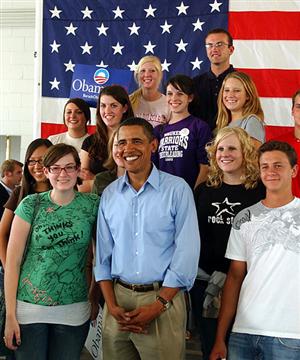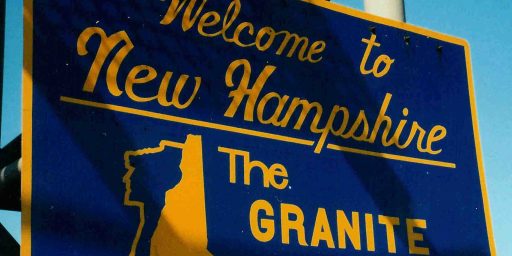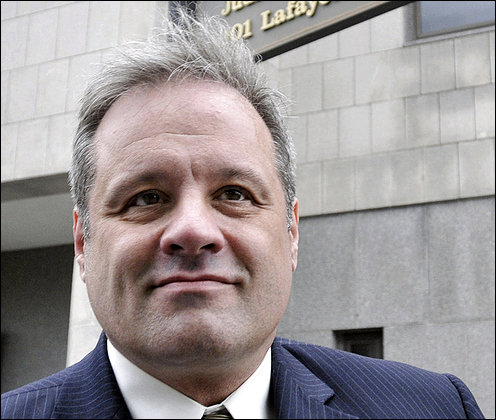Obama’s Race an Asset for Young Voters
 YahooNews has applied the nonsensical headline “Young voters: Obama’s race as an asset, non-issue” to an AP story about how various age cohorts view the issue of race in general and Barack Obama in particular. Either something is an issue or it isn’t. If it’s an asset, it’s an issue.
YahooNews has applied the nonsensical headline “Young voters: Obama’s race as an asset, non-issue” to an AP story about how various age cohorts view the issue of race in general and Barack Obama in particular. Either something is an issue or it isn’t. If it’s an asset, it’s an issue.
For young voters, Rosa Parks’ refusal to sit at the back of a bus in Montgomery, Ala., in 1955 is schoolbook history. Even the racially charged 1992 riots in Los Angeles are a distant memory.
The United States is far from a blueprint for racial harmony, but for today’s young adults — all born after segregation was outlawed in the mid-1960s — race is not the issue it once was. They have grown up with Oprah Winfrey and Michael Jordan among their highest-profile and wealthiest role models. And in their everyday lives, they are much more likely than their elders to have friends of another race, studies show. Is it any wonder, then, that young adults have been the most willing age group to support a black man for president?
Primary exit polls conducted for The Associated Press illustrate the generational shift that has helped Barack Obama secure the Democratic presidential nomination. About 56 percent of Democrats younger than age 30 supported Obama. That number dropped steadily with each age bracket to a low of 30 percent for voters 65 and older.
Many young voters say a diverse background is an asset for a candidate. “Rather than just being tolerant of race, we embrace and accept our differences,” says Alisha Thomas Morgan, a 29-year-old black state lawmaker in Georgia. “We all recognize that racism still exists. But I think younger people are much more willing to get over it.”
They also are more accustomed to seeing people of color in positions of power. The country has, for instance, had a black secretary of state for the past seven-plus years. “I shouldn’t say we’re taking it for granted. But it’s not especially strange to us,” says Tobin Van Ostern, a junior at George Washington University who is spending his summer in Chicago as a leader for Students for Barack Obama.
Van Ostern, who is white, says he understands that Obama’s victory is historic. “But it’s one that seems appropriate for the direction the country is going,” he says. “In numerous ways, it presents a new image of the United States to the world — and not just because of the color of his skin.”
[…]
The way Patricia Turner sees it, Obama’s race is just one factor that makes him more accessible to younger voters. Turner is a professor of African-American studies at the University of California, Davis, a diverse campus where she says no one racial or ethnic group is the majority. She recalls a conversation at a recent university dinner where her table included a few Asian-American students and a white woman in her 30s who was married to a man of mixed race. Asked what struck them about Obama, they listed everything from his age and rearing by a single mother to the fact that he is biracial. “There’s something about the sophisticated and complex ethnic identity that resonates with younger voters as well,” says Turner, who is black. “Younger people are able to say ‘we’ — and that ‘we’ includes Barack Obama.”
The story is mostly anecdote with only one fact (the polling by cohort) to buttress the point. So, let me respond in kind.
I was born just a few months after the Voting Rights Act of 1965 passed and went to school with it never occurring to me that black kids should go to a different one. And I’ve rooted for black athletes, enjoyed black actors and comedians, had at least one outstanding black high school teacher, and had, as a young Army officer, both a black battery commander and a black Chairman of the Joint Chiefs of Staff.
While aware of the color of these people’s skin — it was both visually obvious and culturally remarked upon with some constancy — I was able to judge them based on their performance and by the same standards that I would have applied to whites in those positions.
At no time, however, did I say to myself, “How awesome is it that they’re black! This must be a real treat for me!*”
It strikes me as implausible that a significant number of people who are 10-20 years younger than me, who, as noted in the story, have grown up with blacks in key leadership positions as a norm, would be fascinated by Obama’s biracial existence and exotic upbringing and conclude that these things would make him a great president.
Photo: Seattle Policore
_____________________
*See John Wayne and Roscoe Lee Browne in “The Cowboys” (1972) if this reference is unfamiliar to you.






Yes – they are making it an issue, for a number of reasons:
1 – as a candidate, his resume is totally unimpressive. Not to pick on you, James, but your resume is more impressive than Obama’s.
2 – His grasp of the issues is flimsy at best.
3 – The Democrats believe in identity politics because it furthers their agenda of dependence on the government, but they have to couch it as “not an issue” while being “an asset” for fear that it will would sound like racism – which it is.
It’s gotten him far. Will it carry him to the White House?
I thought Ferarro was the only person who could look at the history of presidential elections (or even primaries) in the US and conclud that black men have a decided advantage over white men and women …
I’m not a huge fan of Obama, but I think he was right when he said being a black man was neither an advantage nor a disadvantage to him in running. The votes he gains for being black will balance the votes he loses for being black.
As a Southerner born well before the turnaround in racial discrimination, and as one that has worked closely with people of black descent for over 40 years, I have absolutely no problem with a qualified black as president. The key word being “qualified”.
There is precious little that I can absorb about Obama that would qualify him in my mind for the presidency of the United States.